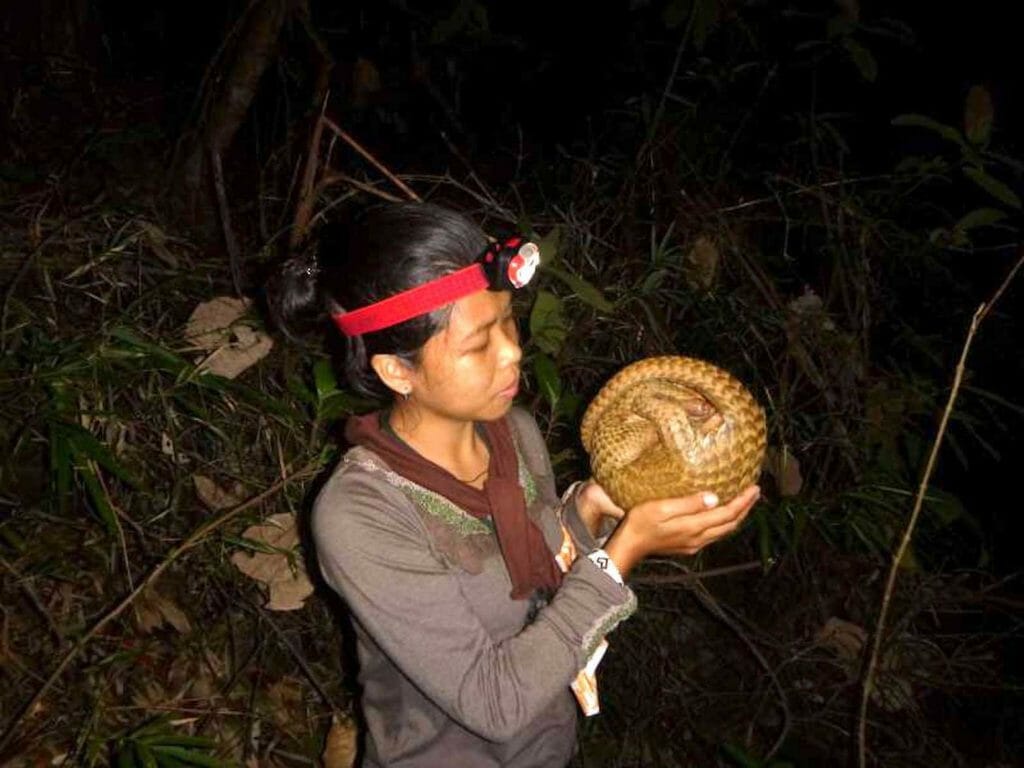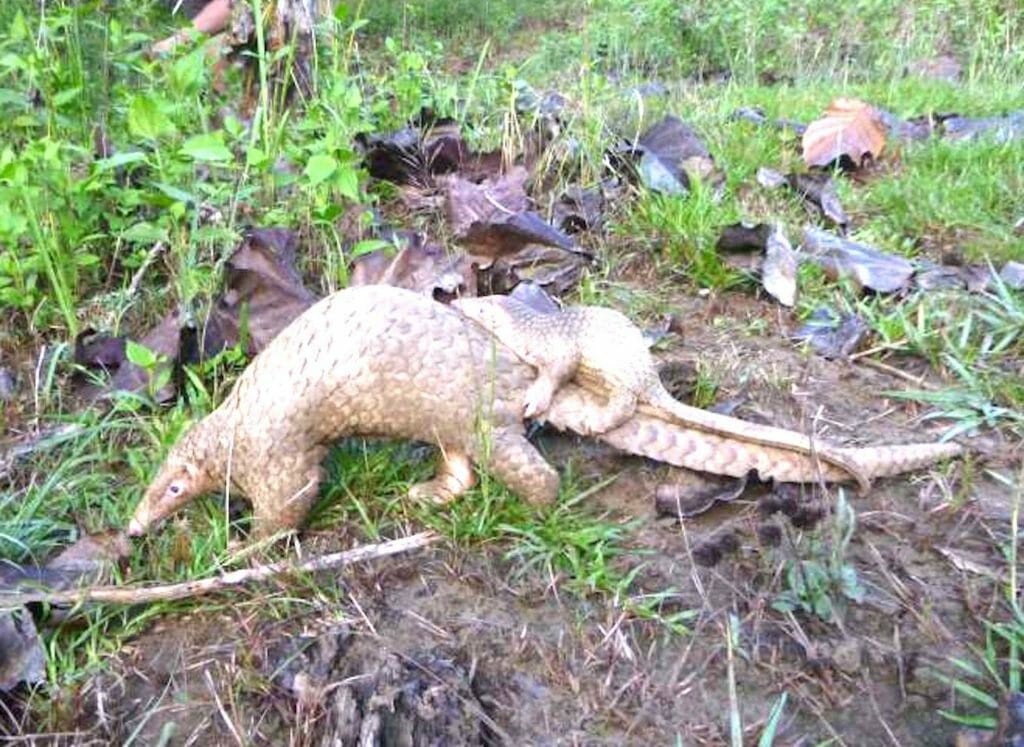A survivors’ homecoming

A wildlife rescuer with endangered pangolin. FLIPSCIENCE
I am watching a video of a pangolin running in the forest, making its way through branches and crunchy leaves. It pauses for a bit, takes a few steps, hesitates, then runs off. It is nakakatuwa, entertaining. It is even more heartwarming knowing that he was illegally captured by wildlife traffickers and this is his homecoming. What the video does not show is that of the six that were stolen from Palawan–only he survived.
Since 2001, the Philippines prohibits any form of hunting, possession, or trade of pangolins. Penalties for Critically Endangered animals range from six months to one year and a fine of P50K to 100K for transporting wildlife; or inflicting injuries to 12 years of imprisonment and/or a fine of one million pesos for killing and destroying species.
Illegal possession of protected species is, in reality, theft. It is a crime of unauthorized possession on a grand scale. The intention is to deprive the animal of its life (if consumed) or natural habitat (as a pet). It deprives area residents of a natural resource. The outcome is the loss of yet another mammal in a planet of dwindling species.
I spoke to Atty. Edward Lorenzo, policy and governance adviser of Conservation International Philippines to know how to best ensure that illegally traded wildlife, if still alive, would be repatriated to Palawan. I needed to understand why, in this specific case, six live pangolins were seized and only one made it home.
The pangolin, Manis culionensis, known as ‘balintong,’ is found only in Palawan. It is one of only eight global species in the world and has the most restricted range. Pangolins are the most trafficked wild mammal in the world, prized for their skin, scales, and meat.
It is classified as Critically Endangered by the International Union for Conservation of Nature (IUCN) in 2018. The trade is international with traffickers crossing national boundaries, often using Chinese vessels. Within the Philippines, seizures have occurred as far north as Bataan and as far south as Misamis Oriental.
Between 2018 and 2019, TRAFFIC researchers conducted surveys in Manila, Makati, Pasay, and Paranaque and found five restaurants that offered off-menu and preorder pangolin meat. Anecdotal observations of traditional Chinese medicine stores in Manila yielded three stores claiming to contain Pangolin derivatives.
Both in transport and point of purchase, pangolins and their derivatives are surreptitiously labeled as other items. While the 28 seizures in 2018-19 has decreased compared to 38 in 2001-2017, the individuals seized has increased –740 from 2001-2017 to 6,894 from 2018-2019.
Buy-bust operation
On Dec.16, 2021, six pangolins were retrieved from a buy-bust operation in Pasay City. An informant shared a pending transaction with the National Anti-Illegal Logging Taskforce (NAILTF) of the Department of Environment and Natural Resources (DENR). Originally created as an enforcement agency for illegal lumber, the NAILT also assists in other environment and wildlife crimes as well.
Worthy of a spy movie, the operation consisted of secretive online discussions to purchase, a furtive pre-operative surveillance in a seafood market, seizure of six live pangolins, two young traffickers, and a mad dash to the wildlife rescue center.
Why only one pangolin was repatriated? During this frenzied week before Christmas, work schedules were cut short, employees attended parties. Super typhoon Odette ravaged the central and southern part of the Philippines, resulting in power outages and loss of internet access. This is the backdrop in which some of the bureaucratic tangles occurred.
The seizure of wildlife and apprehension of suspects occurred around 4:30 p.m. The NAILTF and other members of the team had gathered as early as 11:00 a.m. They had been alerted of the possible transaction only days before, and it is a testament to their agility and proficiency that they were able to pivot to this operation from another one involving marine turtles.
Foremost in their minds was the possibility of conducting the first buy-bust operation of live pangolins. Previous cases involved deceased pangolins and their derivatives, live pangolins chanced upon during a routine inspection, and even a pangolin wandering around Makati.
The operation went smoothly. Many things could have gone wrong. Although in the presence of danger all throughout, the hardship team members experienced consisted mostly of waiting: for the traffickers, Pasay City police, DENR representatives, media. Onsite, the perimeter was secured, evidence was seized, reports prepared.
Insufficient deterrent
By 8:30 p.m. the six pangolins were at the Ninoy Aquino Park and Wildlife Center. Dr. Glenn Maguad of the Biodiversity Management Bureau (BMB) cut open the nettings, so taut that the blade was about an inch away from the bodies. Each pangolin was assigned an alphabet letter as identification, examined for bodily damage, coaxed to unfurl, and weighed. All were alive, although some were more active than others.
After examination, they were brought to a pen on the property. The intention was to expedite the process of returning them to Palawan. Because of the pangolins specialized diet and the scarcity of their food source outside of Palawan, their return was essential to their survival.
But this was complicated. The first conviction of pangolin traffickers outside of Palawan occurred in 201_ when three traffickers were sentenced in a Cavite court for transporting ten live pangolins. Only three survived. The traffickers were each sentenced to jail for three months and fined P20,000, which many wildlife experts consider to be insufficient as a deterrent to illegal wildlife trading.

Pangolin with baby. FILE
A criminal case had been filed but since the pangolins themselves were evidence, special considerations applied. Two pangolins died soon after and necropsies performed reported stress due to starvation, so the health of the remaining pangolins was precarious.
Repatriation to Palawan was possible only by order of the Pasay City Court, and to attain this the DENR had to present a motion to the prosecutor attesting to the urgency of their return–taking one to two weeks. Then, not all aircrafts are designed to carry live animals in the cargo hold, but fortunately Cebu Pacific had such a flight available. The pangolin would even have its own pallet.
Coordination between DENR and the Palawan Council for Sustainable Development (PCSD) was essential, since the PCSD would have the responsibility of releasing the pangolins back into the wild. Created in 1992, the PCSD is responsible for the governance and implementation of and providing policy direction to the Strategic Environmental Plan (SEP) of Palawan, as well as being the lead agency to implement the Wildlife Act in Palawan. Final outputs include plans, policies, and guidelines, advisory and technical assistance, and the enforcement and monitoring of the SEP.
Lack of leadership
Who was responsible for the preventable deaths of the other five pangolins? There is enough blame to pass around, starting from consumers of pangolin derivatives, a string of people involved in the procurement of pangolins such as fisher folks who use their boats for transport, as in this case, to the middlemen plying several oceans routes like between Palawan and Batangas, to restaurants and stores, to indifferent government officials.
But one cannot diminish the success of this particular operation by counting lives lost. Statistics show a match characterized by a lopsided balance of power, where loss is already built into the equation, and where the purpose of the game is to start at zero pangolins saved and move up. And in this play of grand theft, wildlife advocates get bonus points for creating shortcuts for repatriation and for smoothing out the rough roads of wildlife protection by the constant pounding of feet.
In the video, the pangolin paused to redirect, to get a sense of where he was. This was most likely not his original home. He was probably sniffing this new world, encumbered by poor eyesight, they are equipped with a keen sense of smell, hoping to catch a whiff of his favorite ants or termites. He may not survive without it.
On the other hand, their cryptic habits–solitary, silent, and semi-arboreal—may help him to escape detection. Nevertheless, his is a triumphant homecoming. This inbound trip was quite unlike his outbound one. He was not wrapped tightly in nylon netting encased in a plastic grocery bag. Unlike his travel companions, he survived. Now it is my duty to tell the tale.
Almira Astudillo Gilles is a research Associate in Anthropology at the Field Museum and the National Museum Philippines. She has published in numerous genres. Her first novel, The Fire Beneath: Tales of Gold, was influenced by the discovery of the largest Gold artifact in Mindanao. She received the Philippine Presidential Award for her writing in 2012. She holds a PhD in Social Science, an MA in Comparative Political Sciences and an MA in Labor Relations. For this article, she would like to thank Atty. Edward Lorenzo for an insightful interview and valuable advice.

